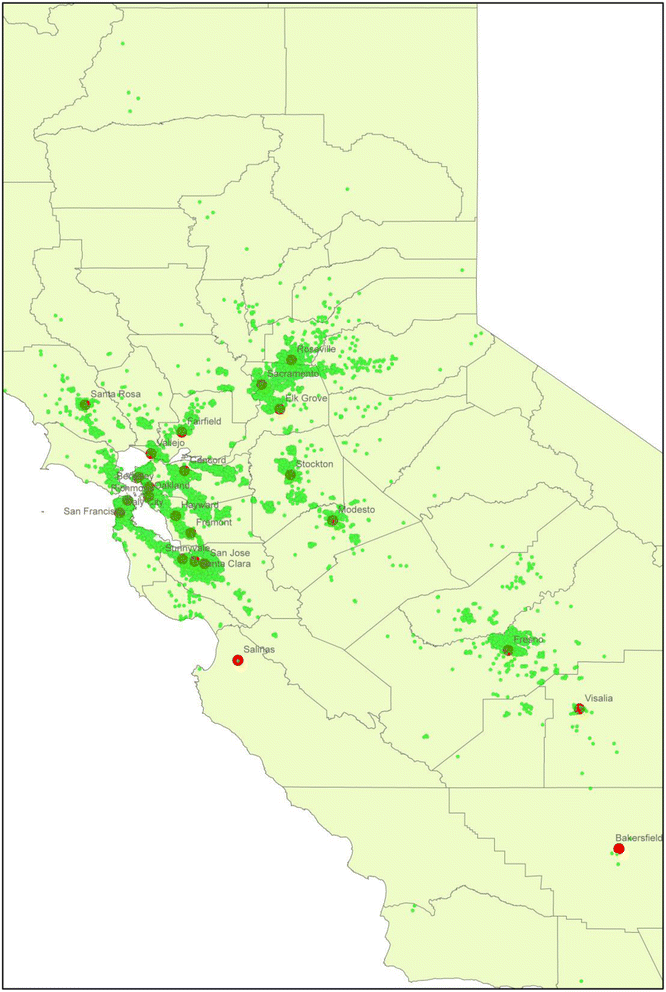The Kaiser Permanente Northern California research program on genes, environment, and health (RPGEH) pregnancy cohort: study design, methodology and baseline characteristics
- PMID: 27899076
- PMCID: PMC5129213
- DOI: 10.1186/s12884-016-1150-2
The Kaiser Permanente Northern California research program on genes, environment, and health (RPGEH) pregnancy cohort: study design, methodology and baseline characteristics
Abstract
Background: Exposures during the prenatal period may have lasting effects on maternal and child health outcomes. To better understand the effects of the in utero environment on children's short- and long-term health, large representative pregnancy cohorts with comprehensive information on a broad range of environmental influences (including biological and behavioral) and the ability to link to prenatal, child and maternal health outcomes are needed. The Research Program on Genes, Environment and Health (RPGEH) pregnancy cohort at Kaiser Permanente Northern California (KPNC) was established to create a resource for conducting research to better understand factors influencing women's and children's health. Recruitment is integrated into routine clinical prenatal care at KPNC, an integrated health care delivery system. We detail the study design, data collection, and methodologies for establishing this cohort. We also describe the baseline characteristics and the cohort's representativeness of the underlying pregnant population in KPNC.
Methods: While recruitment is ongoing, as of October 2014, the RPGEH pregnancy cohort included 16,977 pregnancies (53 % from racial and ethnic minorities). RPGEH pregnancy cohort participants consented to have blood samples obtained in the first trimester (mean gestational age 9.1 weeks ± 4.2 SD) and second trimester (mean gestational age 18.1 weeks ± 5.5 SD) to be stored for future use. Women were invited to complete a questionnaire on health history and lifestyle. Information on women's clinical and health assessments before, during and after pregnancy and women and children's health outcomes are available in the health system's electronic health records, which also allows long-term follow-up.
Discussion: This large, racially- and ethnically-diverse cohort of pregnancies with prenatal biospecimens and clinical data is a valuable resource for future studies on in utero environmental exposures and maternal and child perinatal and long term health outcomes. The baseline characteristics of RPGEH Pregnancy Cohort demonstrate that it is highly representative of the underlying population living in the broader community in Northern California.
Keywords: Biorepository; Cohort; Maternal health; Pregnancy; Resource.
Figures
Similar articles
-
The Pregnancy Environment and Lifestyle Study (PETALS): a population-based longitudinal multi-racial birth cohort.BMC Pregnancy Childbirth. 2017 Apr 17;17(1):122. doi: 10.1186/s12884-017-1301-0. BMC Pregnancy Childbirth. 2017. PMID: 28415965 Free PMC article.
-
Gestational influenza and bipolar disorder in adult offspring.JAMA Psychiatry. 2013 Jul;70(7):677-85. doi: 10.1001/jamapsychiatry.2013.896. JAMA Psychiatry. 2013. PMID: 23699867
-
Study of Women, Infant Feeding, and Type 2 diabetes mellitus after GDM pregnancy (SWIFT), a prospective cohort study: methodology and design.BMC Public Health. 2011 Dec 23;11:952. doi: 10.1186/1471-2458-11-952. BMC Public Health. 2011. PMID: 22196129 Free PMC article.
-
Measuring integrated care.Dan Med Bull. 2011 Feb;58(2):B4245. Dan Med Bull. 2011. PMID: 21299927 Review.
-
Polish Mother and Child Cohort Study (REPRO_PL) - Methodology of the follow-up of the children at the age of 7.Int J Occup Med Environ Health. 2016 Nov 18;29(6):883-893. doi: 10.13075/ijomeh.1896.00811. Epub 2016 Oct 21. Int J Occup Med Environ Health. 2016. PMID: 27869239 Review.
Cited by
-
Pathogenic variants in the healthy elderly: unique ethical and practical challenges.J Med Ethics. 2017 Oct;43(10):714-722. doi: 10.1136/medethics-2016-103967. Epub 2017 Mar 24. J Med Ethics. 2017. PMID: 28341755 Free PMC article.
-
The Kaiser Permanente Research Bank Cancer Cohort: a collaborative resource to improve cancer care and survivorship.BMC Cancer. 2022 Feb 25;22(1):209. doi: 10.1186/s12885-022-09252-6. BMC Cancer. 2022. PMID: 35216576 Free PMC article.
-
Comparing the Risk of Poor Outcomes Among Hepatitis C-Infected, Cured, and Never-Infected Controls.Gastro Hep Adv. 2024 May 15;3(6):871-879. doi: 10.1016/j.gastha.2024.04.015. eCollection 2024. Gastro Hep Adv. 2024. PMID: 39280914 Free PMC article.
-
Visualizing novel connections and genetic similarities across diseases using a network-medicine based approach.Sci Rep. 2022 Sep 1;12(1):14914. doi: 10.1038/s41598-022-19244-y. Sci Rep. 2022. PMID: 36050444 Free PMC article.
-
Inflammatory Conditions During Pregnancy and Risk of Autism and Other Neurodevelopmental Disorders.Biol Psychiatry Glob Open Sci. 2023 Oct 11;4(1):39-50. doi: 10.1016/j.bpsgos.2023.09.008. eCollection 2024 Jan. Biol Psychiatry Glob Open Sci. 2023. PMID: 38045769 Free PMC article.
References
-
- Bellamy L, Casas JP, Hingorani AD, Williams DJ. Pre-eclampsia and risk of cardiovascular disease and cancer in later life: systematic review and meta-analysis. BMJ. 2007;335:974. doi: 10.1136/bmj.39335.385301.BE. - DOI - PMC - PubMed
Publication types
MeSH terms
Grants and funding
LinkOut - more resources
Full Text Sources
Other Literature Sources
Medical


